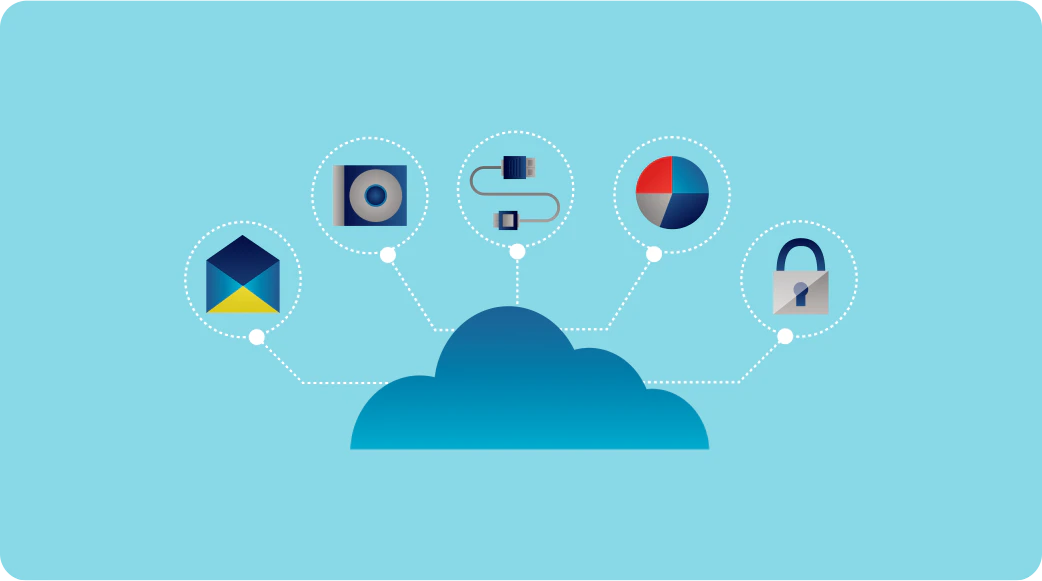The Rise of Cloud Computing: Unveiling Advantages and Key Considerations
Businesses continuously seek novel solutions to organize processes and increase efficiency in today's fast-paced, globally linked environment.
Cloud computing is one such option that has become quite popular recently.
The emergence of cloud computing has completely changed how companies handle, process, and access data. The foundation of cloud computing is that direct computation occurs on a computer that is often remote and not immediately in use. Remote or cloud servers store and handle the data gathered throughout this procedure. It implies that the cloud-accessing gadget won't have to exert as much effort.
This blog will examine the benefits and issues related to cloud computing, illuminating its effect on organizations and the elements to consider when using cloud-based solutions.
The Rise of Cloud Computing: Advantages and Considerations
Cloud computing offers a multitude of advantages that have transformed the business landscape. Let's delve into some of the key benefits and considerations associated with the rise of cloud computing:
Advantages of Cloud Computing

Scalability and Flexibility: Thanks to cloud computing, businesses can scale their resources up or down depending on their needs. With cloud-based solutions, companies can easily adjust to shifting customer needs and ensure they have the right infrastructure to support their operations. The scalability of cloud computing offers significant benefits by reducing the risks connected to internal operational and maintenance difficulties. Businesses may use high-performance resources by utilizing professional-grade resources with no upfront costs. This scaling capability guarantees maximum operational effectiveness while reducing the risks of operating on-premises systems. Furthermore, the flexibility of the cloud enables companies to optimize resource allocation based on urgent needs. Organizations can dynamically scale their cloud capacity up or down, ensuring they have available resources when needed. Businesses can adjust quickly to market changes and effectively handle workload increases thanks to this agility, all without sacrificing performance or adding unneeded expenses.
Cost savings: Traditional IT infrastructure necessitates hefty initial hardware and software investments. However, because companies may access computer resources on a pay-as-you-go basis with cloud computing, there is no longer a need for such capital investments. Companies may lower their IT costs and more efficiently manage resources thanks to the pay-per-use approach. For enterprises, cloud computing has significant cost-saving advantages. Businesses may efficiently cut costs and optimize budget allocation by utilizing cloud-based technologies.
Improved Collaboration: Thanks to cloud-based collaboration technologies, teams can work together smoothly, regardless of their physical locations. Employees may work together on projects in real time due to increased productivity and improved communication, which produces better results. Cloud-based solutions are adaptable to changing collaboration requirements due to their scalability and flexibility. The days of spending a fortune on physical infrastructure are long gone. Businesses can easily increase their bandwidth and computing power thanks to cloud-based systems. Due to their ability to react quickly to market needs, organizations with more agility have a competitive edge. The seamless scalability of the cloud also lessens operational risks and removes the need for internal maintenance. Businesses may promote better collaboration, increase efficiency, and produce amazing results by using the potential of cloud computing. Use the cloud and set off on a new kind of collaborative trip.
Improved Security: To safeguard the data of their clients, cloud service providers extensively invest in cutting-edge security measures. Compared to conventional on-premises systems, cloud computing offers improved security thanks to consistent upgrades and strong encryption techniques. Disaster recovery strategies and cloud backups also reduce the possibility of data loss and downtime. Cloud platforms now provide strengthened security against unauthorized access and data breaches thanks to strict encryption algorithms and multi-factor authentication systems. Furthermore, ongoing surveillance and sophisticated threat detection technologies guarantee prompt discovery and reduction of any dangers. Businesses receive assurance from this improved security architecture that their critical data is protected from emerging cyber threats. The enhanced security measures that cloud computing offers are a crucial pillar in protecting organizations' digital assets worldwide as it continues to advance.
Greater Mobility Cloud computing enables access to data and apps from any internet-connected device employee. The flexibility and agility of the workforce made possible by this mobility eventually leads to higher production and happier employees. Cloud computing offers unparalleled mobility and flexibility for businesses. Its transformative capabilities enable seamless access to data and applications from any location, empowering employees to work remotely and collaborate effortlessly. This mobility eliminates traditional infrastructure constraints, allowing teams to stay connected and productive while on the go. Furthermore, the cloud's mobile-friendly features facilitate real-time communication and information sharing, enabling quick decision-making and agile responses to market demands. Whether accessing critical files on a smartphone or collaborating in virtual environments, the cloud empowers businesses with enhanced mobility, enabling them to thrive in today's fast-paced and interconnected world.

Considerations for Cloud Computing Adoption
Even while the benefits of cloud computing are strong, there are other factors that companies should consider before fully using cloud-based solutions. For a seamless transition, it's crucial to consider the following elements:

Data Security and Privacy: Despite the strong security precautions, organizations need to know where their data is stored and who has access to it. Organizations must evaluate the security measures the selected cloud providers use and ensure they adhere to all applicable data protection laws. The implementation of strong security measures is required to address these worries. Advanced cryptographic algorithms and other encryption techniques can protect data from unauthorized access. Strong authentication systems and role-based permissions are only two examples of access controls limiting access to authorized employees.Additionally, constant cloud infrastructure audits and monitoring might find any irregularities or security breaches. Businesses may proactively identify and mitigate possible risks by implementing intrusion detection systems and security information and event management (SIEM) solutions.
Reliability and Downtime: Cloud service reliability is essential for ongoing company operations. Despite their best efforts, cloud companies nonetheless occasionally experience disruptions. Businesses should think about how downtime can affect their operations and assess the dependability history of possible cloud providers. For enterprises utilizing cloud services, reliability is of utmost importance. The reliability and availability of their systems are priorities for cloud providers. They use redundant systems, data replication, and failover procedures to reduce the danger of service disruptions. Cloud service providers can lessen the effects of hardware failures or natural catastrophes by distributing resources across several data centers. The likelihood of downtime is reduced, and dependability is increased by this distributed design. Even with these precautions, cloud computing occasionally experiences outages. When a service or program is inaccessible to users, it is called downtime. Several things, such as network failures, software bugs, or maintenance operations, may bring it on.
Bandwidth and Connectivity: Internet connectivity is crucial for cloud computing. It is important to have sufficient bandwidth and dependable internet connections to utilize cloud resources effectively. Organizations must assess their current network architecture and consider redundancy measures to guarantee continuous access to cloud services. In basic words, the capacity and speed of data transmission between user devices and cloud servers are referred to as bandwidth. The network's overall performance and user experience are impacted by how quickly information moves across it. With cloud computing, organizations can easily extend their bandwidth to meet rising demand without making expensive infrastructure expenditures. Contrarily, connectivity refers to the dependability and accessibility of the user's network connection to the cloud service provider. It includes elements like availability, latency, and network stability. Thanks to a strong and connected network, businesses can easily access and use their cloud resources, which boosts productivity and agility. /b> Cloud computing enables access to data and apps from any internet-connected device employee. The flexibility and agility of the workforce made possible by this mobility eventually leads to higher production and happier employees. Cloud computing offers unparalleled mobility and flexibility for businesses. Its transformative capabilities enable seamless access to data and applications from any location, empowering employees to work remotely and collaborate effortlessly. This mobility eliminates traditional infrastructure constraints, allowing teams to stay connected and productive while on the go. Furthermore, the cloud's mobile-friendly features facilitate real-time communication and information sharing, enabling quick decision-making and agile responses to market demands. Whether accessing critical files on a smartphone or collaborating in virtual environments, the cloud empowers businesses with enhanced mobility, enabling them to thrive in today's fast-paced and interconnected world.
How Blue IT Systems Overcome IT Challenges
Blue IT Systems addresses these challenges by providing comprehensive managed IT services. Let's explore how they overcome common IT challenges faced by small businesses:
Limited IT resources and expertise: Blue IT Systems extends a small business's IT staff by offering professional assistance and direction. They have a staff of competent individuals with various technical specialties who can handle various IT duties effectively.
Data breaches and cybersecurity concerns: Blue IT Systems employs strong security procedures to guard against cyber-attacks. It comprises intrusion detection systems, antivirus software, firewalls, and routine security assessments.
Ineffective IT infrastructure and out-of-date technology: Blue IT Systems evaluates the current IT infrastructure and recommends any required improvements or replacements to guarantee optimum performance and dependability.
System failures and downtime affecting business operations: Blue IT Systems uses proactive monitoring and maintenance to spot problems and fix them before they affect normal business operations. To reduce downtime, they also use backup and disaster recovery programs.
Difficulty maintaining software updates and patches: Blue IT Systems maintains software updates and patches to keep systems current with the most recent security updates and feature upgrades.
Data loss and the absence of trustworthy backup solutions: Blue IT Systems uses data backup and recovery solutions to ensure that important corporate data is securely backed up and can be recovered in the event of data loss or system failures.
Barriers to communication and teamwork: Blue IT Systems offers technologies for communication and teamwork that enable smooth engagement and cooperation among employees, regardless of their location.

Conclusion
The rise of cloud computing has resulted in a fundamental change in the corporate environment, providing several benefits that enable organizations to optimize their processes and increase their agility. Businesses may embrace the potential of cloud computing and stay ahead in today's cutthroat market with careful preparation, in-depth examination, and smart decision-making.
We at Blue IT Systems are dedicated to assisting companies in realizing the full benefits of cloud computing. With the help of our knowledge, individualized approach, and extensive selection of cloud solutions, we enable businesses to adopt cloud technology, streamline their processes, and accomplish their strategic goals.
Blue IT Systems GmbH is a prominent company specializing in various aspects of IT solutions. With expertise in app development, software development, website development, and UI/UX designs, they are a trusted partner for businesses seeking cutting-edge technological solutions. Their team of skilled professionals deeply understands the latest industry trends and employs innovative approaches to deliver exceptional results
Blue IT Systems GmbH consistently delivers high-quality solutions tailored to meet the unique requirements of its clients. Our commitment to excellence and customer satisfaction sets us apart, making them a go-to choose for businesses looking to harness the power of technology for their growth and success. To start your cloud computing adventure confidently, contact us at our email hello@it-blue.com.